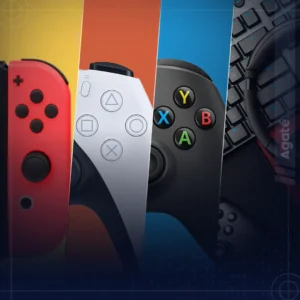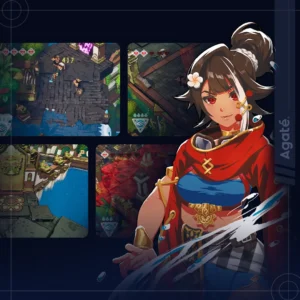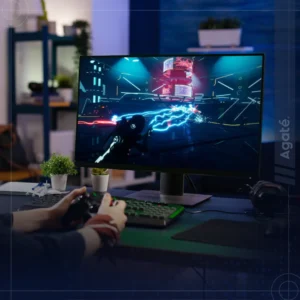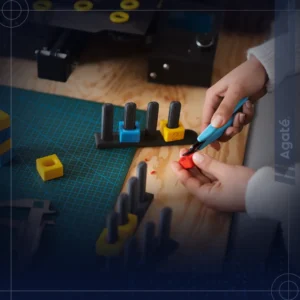The video game industry has been growing at an unprecedented rate, with the global market is expected to reach $384.90 billion in 2023, with a projected compound annual growth rate (CAGR 2023-2027) of 7.89%. This is estimated to result in a market volume of US$521.60 billion by 2027. The need for top-notch game development services is higher than ever. However, not all game development companies offer the comprehensive full-cycle service that ensures a game’s success. Are you curious about what full-cycle game development entails and how it works? Let’s dive in!
What is Full-Cycle Game Development?
Full-cycle game development refers to the entire process of creating a video game, from concept and design to production, testing, and release. A full-cycle game development service provider or game development company that provides such service is responsible for all aspects of game development, including planning, coding, designing, testing, and launching.
In other words, full-cycle game development is a comprehensive service that includes everything needed to create a video game from start to finish. It encompasses a range of services, such as game design, storyboarding, 2D and 3D art, animation, programming, sound design, quality assurance testing, marketing, and launch.
Why Game Developer Companies Offer Full-Cycle Development Service
Game development is a complex and challenging process that requires a lot of skills, resources, and creativity. Creating a successful game involves designing, coding, art, animation, sound, marketing, and maintenance. Managing all these aspects can be overwhelming and costly for many game publishers and studios. That’s why they often turn to game development companies that offer full-cycle development services.
By choosing a game developer company that offers full-cycle development services, they can get a complete and customized solution that meets their needs and expectations. Here are some of the benefits to those companies:
Comprehensive Service
Full-cycle game development offers a comprehensive service that covers all aspects of game development. This means you don’t have to worry about hiring multiple companies or freelancers to handle different parts of the development process. Full-cycle game development service takes care of everything from conceptualization and design to programming, testing, and deployment. They also provide ongoing maintenance and support to ensure that your game runs smoothly and stays up-to-date with the latest technology.
Time and Cost Savings
By hiring a full-cycle game development service provider, you can save time and money. Instead of spending time and resources coordinating with multiple companies or freelancers, you can have all your development needs met by a single company that provides all the services required.
Better Quality Control
When you work with a full-cycle game development service provider, you can have more control over the quality of your game at every stage of the development process. This allows you to ensure that your project meets your requirements and standards, minimizing the risk of unexpected issues or delays.
Faster Time to Market
With quality control and comprehensive services, full-cycle game development services can help you get your game to market faster. You don’t have to worry about coordinating with multiple companies or freelancers. The service takes care of everything from start to finish, reducing the time it takes to get your game to market. This can be especially important in the fast-paced gaming industry, where time is often of the essence.
More Flexibility
Full-cycle game development service providers offer more flexibility than traditional game development companies. They offer custom solutions to meet your specific needs. They can adapt to your changing requirements, providing you with the flexibility to modify your game as necessary. This can be particularly important for indie game developers who need to be nimble and responsive to changes in the market or player preferences.
How Does Full-Cycle Game Development Work?
Full-cycle game development typically follows a process that includes the following stages:
Game Planning: Concept and Design
The first stage of full-cycle game development involves developing the concept and design of the game. This includes creating the story, characters, game mechanics, and visual style. Before the writers can put pen to paper, the designers can let their creative juices flow, and the developers can start coding away, there needs to be an idea for the video game. It’s the first step in the planning process and the cornerstone on which the entire project will be built. Once a variety of concepts have been brainstormed, the team creates a proof of concept to evaluate the feasibility of the ideas in terms of the studio’s ability to execute them. Following this, a series of additional questions must be addressed, such as the estimated cost of development, the necessary technological requirements, the need for a new gaming engine, the size of the team needed, the possibility of hiring external writers and voice actors, the projected launch timeline, and the monetization strategy.
Pre-Production & Production
During the development stage of a game, the focus shifts toward the creation and implementation of various game elements. This phase involves coding and programming, which are crucial for the game mechanics. Additionally, game assets such as 2D and 3D animations, graphics, and sound effects are created to enhance the gaming experience. These assets play a significant role in defining the visual and auditory appeal of the game. The development stage is essential in determining the overall quality of the game and involves the collaboration of various experts, including programmers, designers, artists, and sound engineers. It is a complex process that requires attention to detail and constant refinement to achieve the desired outcome.
Quality Assurance Testing
Quality assurance testing is an essential stage in full-cycle game development. This stage involves testing the game for bugs, glitches, and other issues that could affect the gameplay experience. The importance of Quality Assurance in gaming can’t be overstated. It is crucial to screen for minor nuisances like overlapping text, bugs, and glitches that could impact the game’s performance, as players are more likely to leave negative reviews than positive ones. Leaving bugs in the game could lead to negative reviews, which could significantly impact the game’s ranking and success.
It is also important to consider game compatibility. A game might perform well on one operating system but experience glitches on others. Therefore, it is vital to conduct the Quality Assurance process on various platforms to ensure that the game performs at the highest level on every device.
Marketing and Launch
The final stage of full-cycle game development involves marketing and launching the game. A strong launch captures early user interest, which drives installs and downloads right out of the gate. This includes creating promotional materials, such as trailers and screenshots, and submitting the game to app stores and other platforms.






